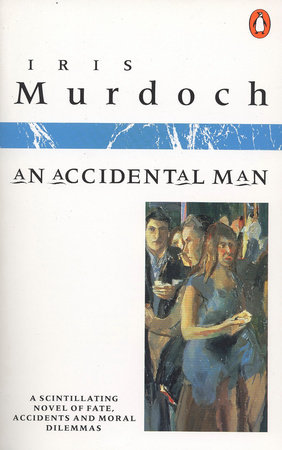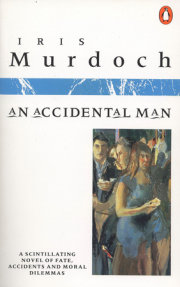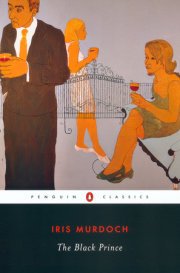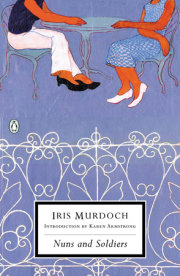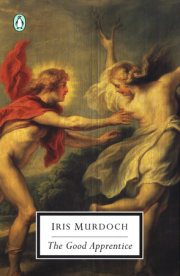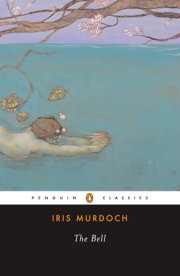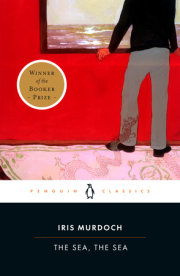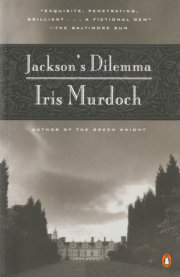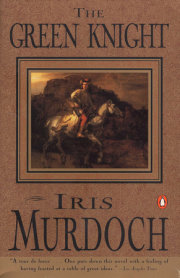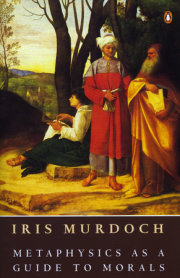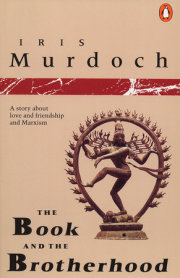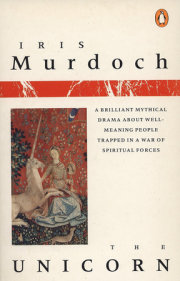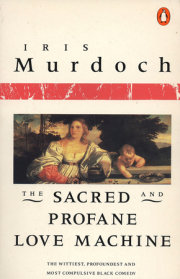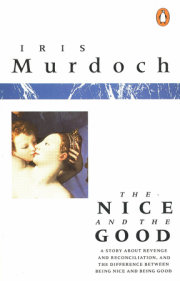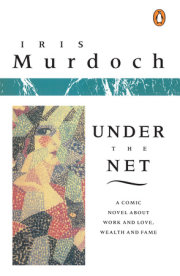Table of Contents
Title Page
Copyright Page
Dedication
PENGUIN BOOKS
AN ACCIDENTAL MAN
Iris Murdoch was born in Dublin in 1919 of Anglo-Irish parents. She went to Badminton School, Bristol, and read classics at Somerville College, Oxford. During the war she was an Assistant Principal at the Treasury, and then worked with UNRRA in London, Belgium and Austria. She held a studentship in philosophy at Newnham College, Cambridge, and then in 1948 became a Fellow of St Anne’s College, Oxford, where she lived with her husband, the teacher and critic John Bayley. Awarded the CBE in 1976, Iris Murdoch was made a DBE in the 1987 New Year’s Honours List. In the 1997 PEN Awards she received the Gold Pen for Distinguished Service to Literature.
Iris Murdoch wrote twenty-six novels, including Under the Net, her writing début of 1954, the Booker Prize-winning The Sea, the Sea (1978) and, more recently, The Green Knight (1993) and Jackson’s Dilemma (1995). She received a number of other literary awards, among them the James Tait Black Memorial Prize for The Black Prince (1973) and the Whitbread Prize for The Sacred and Profane Love Machine (1974). Her works of philosophy include Sartre: Romantic Rationalist, Metaphysia As a Guide to Morals (1992) and Existentialists and Mystics (1997). She also wrote several plays, including The Italian Girl (with James Saunders) and The Black Prince, an adaptation of her novel. Her volume of poetry, A Year of Birds, which appeared in 1978, was set to music by Malcolm Williamson.
Iris Murdoch died in February 1999. Among the many who paid tribute to her as a philosopher, novelist and private individual was Peter Conradi, who in his obituary in the Guardian wrote ‘Iris Murdoch was one of the best and most influential writers of the twentieth century. Above all, she kept the traditional novel alive, and in so doing changed what it is capable of ... She connected goodness, against the temper of the times, not with the quest for an authentic identity so much as with the happiness that can come about when that quest is relaxed. We are fortunate to have shared our appalling century with her.’
IRIS MURDOCH IN PENGUIN
Fiction
Under the Net
The Flight from the Enchanter
The Sandcastle
The Bell
A Severed Head
An Unofficial Rose
The Unicorn
The Italian Girl
The Red and the Green
The Time of the Angels
The Nice and the Good
Bruno’s Dream
A Fairly Honourable Defeat
An Accidental Man
The Black Prince
The Sacred and Profane Love Machine
A Word Child
Henry and Cato
The Sea, the Sea
Nuns and Soldiers
The Philosopher’s Pupil
The Good Apprentice
The Book and the Brotherhood
The Message to the Planet
The Green Knight
Jackson’s Dilemma
Non-Fiction
Acastos: Two Platonic Dialogues
Metaphysics As a Guide to Morals
PENGUIN BOOKS
Published by the Penguin Group
Penguin Putnam Inc., 375 Hudson Street, New York, New York 10014, U.S.A.
Penguin Books Ltd, 80 Strand, London WC2R 0RL, England
Penguin Books Australia Ltd, 250 Camberwell Road, Victoria 3124, Australia
Penguin Books Canada Ltd, 10 Alcorn Avenue, Toronto, Ontario, Canada M4V 3B2
Penguin Books India (P) Ltd, 11 Community, Centre, Panchsheel Park, New Delhi — 110 017, India
Penguin Books (N.Z.) Ltd, Cnr Rosedale and Airborne Roads Albany, Auckland, New Zealand
Penguin Books (South Africa) (Pty) Ltd, 24 Sturdee Avenue, Rosebank, Johannesburg 2196, South Africa
Penguin Books Ltd, Registered Offices: Harmondsworth, Middlesex, England
First published in Great Britain by Chatto & Windus 1971
First published in the United States of America by The Viking Press 1972
Published in Penguin Books 1973
Copyright © Iris Murdoch, 1971 All rights reserved
ISBN: 9781101495858
The scanning, uploading and distribution of this book via the Internet
or via any other means without the permission of the publisher is illegal
and punishable by law. Please purchase only authorized electronic
editions, and do not participate in or encourage electronic piracy of
copyrighted materials. Your support of the author’s rights is appreciated.
To Kreisel
‘Gracie darling, will you marry me?’
‘Yes.’
‘What?’
‘Yes.’
Ludwig Leferrier stared down into the small calm radiant un-smiling face of Gracie Tisbourne. Was it conceivable that the girl was joking? It was. Oh Lord.
‘Look, Gracie, are you serious?’
‘Yes.’
‘But I mean—’
‘Of course if you want to back out of it—’
‘Gracie! But — but — Gracie, do you love me?’
‘Can you not infer that from what I said just now?’
‘I don’t want inferred love.’
‘I love you.’
‘It’s impossible!’
‘This is becoming a rather stupid argument.’
‘Gracie. I can’t believe it!’
‘Why are you so surprised?’ said Gracie. ‘Surely the situation has been clear for some time. It has been to all my friends and relations.’
‘Oh damn your friends and relations — I mean — Gracie, you do really mean it? I love you so dreadfully much—’
‘Don’t be so silly, Ludwig,’ said Gracie. ‘Sometimes you’re just a very silly man. I love you, and I’ve done so ever since you kissed me behind that tomb thing in the British Museum. I never thought I’d be so lucky.’
‘But you expected this?’
‘I expected it now.’
‘I didn’t.’
‘So are you now dismayed?’
‘No! I’ve loved you for ages. But you’re so sort of grand. Everyone’s after you.’
‘I’m not grand. And that’s a very vulgar way of putting it.’
‘Sorry—’
‘I’m small and ignorant, whereas you know everything.’
‘As if that—! I thought I was one of hundreds.’
‘Well, you’re one of one.’
‘You’ve been so calm !’
‘A girl has her pride. Shall we now go hand in hand and tell my parents?’
‘No, please — I say, will they mind?’
‘They’ll be delighted.’
‘I somehow thought they wanted you to marry that guy Sebastian.’
‘They want what I want.’
‘They won’t mind my being American?’
‘Why should they? Especially as you aren’t going back to America any more.’
‘You said once they wanted you to marry an Englishman.’
‘Only because anyone else might take me away. But you won’t. We’ll be living in Oxford.’
‘I don’t know about Oxford. Oh Jesus, Gracie, I can’t believe it, I’m so happy — Darling, please—’
Gracie’s divan bed, on which they were sitting was very narrow and fitted in beneath a long white shelf. Small fat cushions, which Ludwig hated, and which Gracie referred to as her ‘pussy cats’, further reduced the sitting or lying area. Ludwig banged his head on the shelf. One hand burrowed under Gracie’s warm thigh. His head sank and he felt the roughness of his cheek against the smoothness of her taut dress. Crushed close together, two hearts battered in their cages. No screen of calm now. Ludwig groaned. He had never made love to her. The thing was anguish.
‘Mind the table!’
He began to fall off, twisting a rubbery leg to avoid a crash, and subsided embracing the coffee pot while Gracie above him stifled laughter. ‘Ssh, Ludwig!’
The Tisbourne’s house in Kensington, pretentiously called Pitt’s Lodge, was a narrow poky little gentleman’s residence cluttered with elegant knick-knacks masquerading as furniture. Ludwig had already broken two chairs. Behind the papery walls of the small rooms Gracie’s parents were omnipresent. Now just outside the door Clara Tisbourne was calling down to her husband, ‘Pinkie darling, the Odmores want us for the second weekend.’ It was an impossible situation even if Gracie had been willing. He could not take Gracie to his own apartment because Gracie disliked Mitzi Ricardo. Mitzi also disliked Gracie and referred to her as ‘little Madam’ until she realized that Ludwig loved her. Perhaps it would have to be the British Museum again.
‘Whatever shall we do?’ he said to Gracie.
‘About what?’
They had never discussed sex. He had no idea whether Gracie was a virgin. Must he now tell her about his campus amours? Oh Christ.
‘Here. Yes, I know. Dear Ludwig, just sit quietly and hold my hand.’
He looked into the mysterious guileless eyes of the girl to whom he had committed himself, his life, his future, his thoughts, his feelings, his whole spiritual being. She was so fantastically young. He felt centuries older than this opening flower. He felt coarse, gross, ancient, dirty. At the same moment it occurred to him that she was almost totally a stranger. He loved, he was engaged to be married to, a complete stranger.
‘Gracie, you are so pure, so true.’
‘That’s your silly talk.’
‘You’re so young!’
‘I’m nineteen. You’re only twenty-two.’
‘When shall we get married? How quickly can one get married in England?’
‘We’ve only just got engaged. Please, Ludwig. You know the way mama bounces in.’
‘What’s the use of being engaged? I want—’
‘It’s nice being engaged. We shall be a long time married. Let’s enjoy our engagement. It’s such a special time. I’ve so much liked the first five minutes of it.’
‘But, Gracie, how are we going to—’
‘Besides, mama will insist on a big white wedding and those things take ages to organize.’
‘Surely we don’t have to have all that crap? Gracie, you know you can always get what you want—’
‘Well, I want it too. It will be such fun. I’ll have Karen Arbuthnot as a bridesmaid—’
‘Gracie, have a heart—’
‘We couldn’t get married now anyway with grandmama so ill. Supposing she were to die on our wedding day?’
‘Is she very ill?’
‘Aunt Charlotte says she’s dying. But that may be wishful thinking.’
‘I feel so terribly afraid I’ll lose you.’
‘Don’t be idiotic. Here’s my hand here, feel it.’
‘Gracie, poppet, are you sure you don’t mind—’
‘What? Ludwig, you’re trembling.’
‘It’s all so sudden. I’ve been in such a state these last weeks.’
‘About little me?’
‘Yes, about you. And about — Yes. Gracie, you’re sure you don’t mind what I’ve done? I mean my not going back ever, my not going to fight, you know—’
‘Why should I mind your not wanting to fight in a wicked war? Why should I mind your choosing to live here in England with me and become English?’
‘Later on you might want to go to America and we couldn’t, I guess.’
‘I don’t want to go to America. You are my America.’
‘Dear Gracie! But — you don’t think it’s dishonourable?’
‘How can it be dishonourable to do the right thing?’
How indeed.
They were sitting side by side, precariously, as if they were on a boat. Ludwig held her right hand tightly in his. His left arm was stretched round her shoulder. His bony tweedy knees were pressed against her sleek knees, pale brown and shiny through openwork tights. She smelt of young flesh and toilet soap and pollen. Oh God, if they could only take their clothes off! Outside it was raining. Warm early summer rain playfully caressed the window. A bright subdued light showed the small pink and white houses opposite against a dark grey sky which shone like illuminated metal. There would be a rainbow somewhere above the park. Elsewhere that war was going on, high explosive and napalm and people killed and maimed. There were people out there who had been at war all their lives.
The crucial date had passed. He had torn up his draft card some time ago. But until lately there had been a way out. Now there was none. He had taken a carefully considered step and with it had chosen exile. He had no regrets, except about his parents. He was their only child. It had been the achievement of their lives to make him what they could never be, genuinely American. They would never understand.
‘Have some more elevenses,’ said Gracie. ‘Have some Tennis Court Cake. I know you like marzipan. Have some Russian gâteau.’
Her little bedroom, which she called her sitting-room, and in which indeed they had so far done nothing but sit, was cosy and prim. Its formality and order were those of a child. This schoolroom neatness, this bitty folky flowery charm, represented, Ludwig suspected, not only Gracie’s unformed taste but also some vanished era in the taste of her parents. He had once heard Gracie resisting Clara’s enthusiastic ideas about redecorating it. A growing miscellany of pictures now fought with the sprigged wallpaper: small Impressionist reproductions, engravings of hawks and parrots, photos of the Acropolis and Windsor Castle and the Taj Mahal. Yet Gracie knew nothing about architecture, nothing about birds, and constantly mixed Van Gogh up with Cézanne. Indeed she appeared to know very little about anything, having firmly left school early and refused any further education. What on earth is one to do, he had once thought, with a girl who has no idea who Charlemagne was and who doesn’t care? Later he admired her nerve and came to prize her calm ignorance. She was without the pretensions and ambitions which powered his own life. Her simplicity, her gaiety, even her silliness lightened his Puritan sadness. Yet he also knew that she was no mere kitten, this almost-child. There was a formidable will crushed up inside this unfolding bud.
‘No thanks, no cake.’
‘Have a jelly baby.’
‘No. I’m still feeling kicked in the stomach.’
“Well, I’m hungry.‘
Gracie was a great eater, but remained slim. She was a pale miniature-looking girl with a small well-formed head and a small eager face. She had glowing powdery flesh, very light blue eyes, and wispy half-long silvery golden hair. When she was petulant she looked like a terrier. When she was self-satisfied, which was often, she looked oriental. She was not coquettish, yet she was very conscious of herself as a young and pretty girl. Her tiny mouth was aware, thoughtful, stubborn. She seemed to Ludwig like a precious relic, an heirloom of vanished feminine refinement, something almost Victorian.
‘Do you think you’ll get the Oxford thing?’
‘Gee, I hope so. I try not to think about it. It matters so much.’
‘I’d like to live in Oxford. It’s such a pretty place. And you can get into the country.’
‘You won’t mind being the wife of a stuffy old ancient history don?’
‘Don’t be absurd, Ludwig. Do you think I want to marry an astronaut or something? I only wish I wasn’t such an ignoramus. I’ll just have to keep quiet and smile. I suppose there are wives like that in Oxford. Still the rest of the family will make a show. Papa was a Senior Wrangler and mama was at Bedford and of course Patrick—’
Anxiety about the Oxford job had contributed to his torment, he wanted that job so dreadfully. Oxford had in these months grown huge and wide and magnetic in his consciousness. This too was a kind of being in love. He pictured himself there like a man picturing paradise. He feared disappointment like a man fearing hell. Of course whatever happened now he would stay on in England after his London scholarship year was over. Athena had here sufficiently seized him by the locks. All the elements of his case were clear to him and he had no more doubt about the rightness of his decision. The war was a piece of absolute wickedness in which he would take no part. He would not fight for the United States of America in that war. But neither was it his task to make politics, to shout and speechify and martyr himself. I am not a political animal, he told himself repeatedly. He was a scholar. He would not waste his talents. He would stay in England, where by a pure and felicitous accident he had been born, and take part in the long old conversation of Europe. To regret that his role was in so many ways an easy one was purely sentimental.
The analysis was clear and the decision was made. Only his protestant conscience, like a huge primitive clumsy processing machine, obsolete yet still operational, continued to give him trouble. If only he could take that awful uncomprehending misery away from his parents. He dreaded their letters in which, in language which both offended and touched him, they begged him to come home and get himself ‘straightened out’. Did they really think he must be mad? He dreaded their confused reproaches, their fear. Old European terrors, inherited from generations of wandering ancestors, coursed in their blood and made them shudder from breaking the laws of the United States and evading its decrees. And there was their dreadful wrong-headed pride. Grief at his absence, fear of bureaucracy, what the neighbours thought, it was all jumbled together.
His father’s family were devout protestants from Alsace. His mother’s family were Lutherans from Bavaria. His maternal grandfather, who disappeared during the war and was thought to have died in a concentration camp, had been a minister. A strong and rigid disapproval of Hitler had led both families to migrate westward, and Ludwig’s parents had met soon after the war in Mont-de-Marson where Ludwig’s father had been working as an electrical engineer. They soon decided to emigrate to America, but while waiting for their visas went first on a brief visit to England so as to improve their English. Here, with what now seemed an intelligent prescience, young Ludwig had achieved an English birth, and with it the right to British nationality, although before his first birthday he was already in the U.S.A. He grew up happily enough, normally enough, as an American child, his parents’ joy. Yet in his blood too old European things lived and waited, and as he became an adult and an intellectual he found himself an unidentified person, a changeling. He inherited the physical awkwardness of his parents and their deep conscientious anxiety. He grew up into problems which they had hoped to leave behind. He was uneasy with his hybrid name. He felt ashamed of being an Aryan German and yet also ashamed of having ceased to be one. His parents, perfectly bilingual in French and German, spoke only English at home, laboriously conversing even when they were alone together in this language which they never fully mastered. Ludwig learnt his French and German at school. His parents were grateful to America, and the glow of that gratitude was shed over his childhood.
When he came at last to Europe no blood relations awaited him. All had died or scattered. What mainly confronted him was the ghost of Hitler. This and many other things needed to be exorcized. As a historian and as a man he needed somehow in thought to undergo the whole passion of recent history, but he could not do it. Faced with what he had so significantly missed, his intellect became hazy and faint. He remained outside it all and yet burdened by it as by something heavy forever trailing behind him, a part of himself which he could never properly see. In America he felt European, in France he felt German, in Germany American. Only in England, which he found in some ways most alien of all, could he somehow forget or postpone the problem of who he was. The company of other historians suited him, Oxford and Cambridge scholars, jokey unexcited men who just took him for granted and assumed quietly that of course he would stay and become British. He was so grateful for that.
There will be a time, he thought, beyond all this, when I shall work calmly on remote important things, and when all this anguish will be over. Meanwhile he knew, engaging his conscience with his reason as if these were independent sovereigns, that he did not feel guilty only because he was disappointing his parents. He felt guilty exactly as they did because he was disappointing the U.S.A., because he was breaking the law, because he had decided not to return, because he feared death and would not be a soldier, because he was behaving as cowards and traitors behave. He accepted the guilt with a kind of calm as if it were not an admonition but a mere phenomenon, an experience, a punishment: a punishment for what was happening right now in the little white house in Vermont where his parents brooded over the incomprehensible doom which their son had pronounced.
The decision was made, completed like a long journey, but still strange to him, and rediscovered every morning with a painful lurid surprise. Of course it was no accident that he had mismanaged the whole thing so horribly. This particular muddle he recognized as, for himself, characteristic. If he had elected to be British much earlier he would never have been drafted. He had, he bitterly put it to himself, hoped to get away with it, hoped to have without drama the best of both his worlds. His drafting had been deferred and deferred again. He had thought and thought but without ever quite bringing himself to make up his mind. There was so much involved, so much at stake. He knew he could stick if he had to, and also he knew himself as in some ways an instinctively timid man, a quiet man who was unwilling to raise his voice, unwillng to be stared at. The final summons came unexpectedly. And now he could not defy it with impunity. As far as the United States was concerned he was in bad trouble. Scurrying now for the bolt hole of another nationality would not save him from the automatic retribution of the country which he was so precipitately abandoning. This aspect of the matter, once he did decide to stick, he deliberately refrained from examining in detail. It seemed that at least fifteen years must pass before he could return without facing immediate arrest. With his claim for British nationality pending it was, he had been advised, unthinkable that he should be extradited as a deserter. But as an American he was now done for.
How much, apart from his distress for his parents, this would really hurt, he had not yet been able to estimate. He was quite certain that he was acting rightly. But this did not make it burn less. He suffered his pangs of guilt and fear and loss and waited for these sufferings to pass. There would be a time for reconciliation and quiet work and the treasure caves of Europe, a time, oh God, for Gracie. He had told her these things, but only in a cool and abstract way. He did not know whether he was glad or sorry that she had accepted them without puzzlement, without profound questioning. With how much of the real tangle and torment would it be fair to burden her; and if he was to marry her would it be right to burden her with less than all?
Her little strong right hand was gripping his. ‘What a pity Patrick is too old to be a page.’
‘A page? Oh sure. I can’t see Patrick as a page! I hope he’ll approve?’
‘Oh yes,’ said Gracie, licking her fingers and still holding his hand, so that he felt her tongue on his palm. ‘He said you were the only genuine intellectual among my swains.’
Patrick was Gracie’s youngest brother. He was still at boarding school. He was bookish and ambitious.
‘Will your parents come over for the wedding?’
Would they? Would they want to? So many things were happening so fast, creating new worlds in which old instinctive ways of acting were no good any more.
The rain suddenly pattered on the window like a handful of pebbles, then grew quiet again. The room brightened with a vivid dark golden light.
‘I don’t know.’
‘Who will you have as your best man?’
‘Must I have a best man? Well, I guess I’d have Garth if he were over here by then, you know, Garth Gibson Grey.’
Ludwig felt a faint electrical shock. Guilt again possibly. He had thought a good deal less about Garth in recent weeks, though when he had first arrived eight months ago the return of Garth had been the thing to which he had most looked forward. He had made Garth’s acquaintance when they were both students at Harvard. Garth, a graduate of Cambridge, England, had been his first close English friend. Garth was studying philosophy. They had immediately started an argument which went on for days, weeks, months. The Harvard philosophers did not think highly of Garth. But Ludwig decided he was one of the most remarkable men he had ever met. He longed for Garth to come back so that they could experience England, Europe, together. He had made all his great decisions since their last talk. He had mentioned them in letters, but without emotion. Garth had replied laconically ‘Good,’ then written about other things, then stopped writing altogether. He was due home in July, but July was still a long way off. And now there was Gracie.
Ludwig recognized the little guilty shock as a realization that when Garth came he would no longer be alone. He would no longer be waiting. I am surrendering my aloneness for ever, he thought, clutching Gracie’s hand. What would Garth think about this engagement? Garth and Gracie, whose families were acquainted, had known each other slightly since childhood. It was through Garth, or more immediately through Garth’s father, Austin Gibson Grey, that Ludwig had met the Tisbournes, Charlotte Ledgard, Mitzi Ricardo, Mavis Argyll and many other of those fearfully English English with whom he now felt so surprisingly at home. Garth had suggested to Ludwig, who was to precede him to England by a year, that he should look up Austin. ‘You may be able to help my father,’ he said cryptically. Austin had certainly helped Ludwig, finding him digs at Mitzi’s place, introducing him to people, setting him on the path to Gracie. Had Ludwig helped Austin? Austin was not easy to help. ‘Austin is hopeless,’ George Tisbourne used to say. ‘Elder brother trouble of course.’ Austin’s elder brother Matthew was a horribly successful diplomat. Austin was not so good at coping. Ludwig rather liked Austin’s hopeless-ness. It relaxed his nerves to see Austin flounder. Of course poor Austin had serious troubles, but for some reason one could never take them too gravely. How surprised Austin would be about Ludwig and Gracie! ‘Not a chance,’ Austin had judged when Ludwig told his love. And what would Garth say? Garth would say nothing. Garth the lone wolf. But Garth would be in some way disappointed. He would feel that Ludwig had been absorbed into ordinariness. They don’t like each other, Garth and Gracie, Ludwig had earlier intuited from Gracie’s chatter. He could see why. And he felt now with a kind of sadness and a kind of pride what it was like to be responsible for the being of another.
‘Do you find that your ears stick to your head at night?’
‘I don’t know, poppet.’
‘Mine do, it does feel funny. You’ve got such nice sleek animal ears. Some men have such coarse ears. Ludwig, do do something for me. Cut your hair very short, the way it used to be. I love it furry.’
‘OK, honey. But it looks so sort of grey when it’s short.’
‘I like it nice and grey.’
He had begun to grow his hair, it occurred to him guiltily, to please another girl.
‘And another thing, Ludwig darling.’
‘What, angel?’
‘Don’t go to see Dorina like that any more.’
Feminine intuition.
‘Why not, sweetheart? You know it’s not—’
‘I know it’s not. I know it’s for Austin. But I hate your being a sort of emotional go-between for them.’
Dorina was Mrs Austin Gibson Grey. Something had happened to poor Austin’s second marriage. But what had happened no one could make out, least of all perhaps Austin and Dorina.
‘Austin trusts me. I can help.’
‘Austin must unravel all that muddle for himself. Please keep out of it. Don’t go to Valmorana’
Valmorana was a sort of hostel for distressed girls which was run by Dorina’s elder sister Mavis Argyll. Mavis was a social worker and generally agreed to be ‘wonderful’, one of those dedicated single women on whom society so much depends. Dorina, fleeing for reasons unknown from her husband, had taken refuge there.
‘You see, at present Dorina just wants to be by herself, but they each want to know how the other—’
‘Yes, yes, Ludwig, I understand. It’s not that I’m against Dorina, one couldn’t be. She’s so touching and sort of caught, And with Austin as a husband — It’s that it’s all such a mess and you can’t really help them, no one can, and you’ll just get pulled into it too—’
‘Don’t get excited, sweetie—’
‘Your going there is like secret police or something. It’s not very important to you, seeing Dorina, is it?’
‘I guess not — But how can I — I’m supposed to be going there tomorrow. What will they think?’
‘One mustn’t worry about what people think. You said that to me once. Make some excuse.’
‘But poor old Austin, he hasn’t got anyone—’
‘Austin gives me the creeps.’
‘But why — is it his funny head?’
‘No, of course not, I don’t mind his funny head. He finds me attractive.’
‘How do you know? God, he never made a pass at you, did he?’
‘No, but a woman knows. A young girl always knows.’
‘So what? I guess everyone finds you attractive. It’s not a crime, poppet darling.’
‘I find him repulsive — no, that’s too strong. He’s old. I hate it when old people find me attractive.’
‘He’s not fifty!’
‘His face creams and mantles like a standing pond.’
‘I think he’s got a very nice face.’
‘He’s so unfortunate.’
‘That’s not a crime either!’
‘It is in him. Bad luck is a sort of wickedness in some people. No, I don’t mean that either. I hate his soupy sort of emotions, the way he looks at life. Sorry. I just don’t want you to go to Valmorana. If you do you’ll get involved in their thing. I don’t want you to be interested in them and in their horrible messy world of quarrelling and forgiving. Please. Do you see?’
Ludwig felt distress. How could he hurt Austin and Dorina who had both been so kind to him? And why shouldn’t he be interested and try to help? He was about to argue when he realized: she is jealous of Dorina. He felt touched, tender, delighted, grateful.
‘All right, honeybun, anything you like. Say, do you think your parents have gone out? I can’t hear a thing.’
‘No, I can hear papa typing. Please, Ludwig. Oh darling, I’m suddenly so frightened. We will be all right, won’t we? Oh let us be all right for ever. There are such terrible things in the world.’
‘Recession. Yes,’ said Austin Gibson Grey. He was not sure what recession meant, but he knew what Mr Bransome meant.
‘It is a matter of computerization.’
‘Indeed.’
‘There is nothing personal involved.’
‘Quite’
‘The management consultants who were here last month—’
‘I thought they were interior decorators.’
‘Possibly they were so described.’
‘They were.’
‘It was a matter of being tactful.’
‘I see.’
‘Recommended a thoroughgoing streamlining of staff ratios.’
‘Ah yes.’
‘You appreciate that we have been losing money.’
‘I do.’
‘Our situation, I say in confidence, is difficult.’
‘I am sorry.’
‘We shall pay you of course for the entire month.’
Thank you.‘
‘But I trust you will feel free to leave at any time.’
‘How kind.’
‘I expect you will wish to find another post.’
‘I will.’
‘I am sure you will have no difficulty in doing so.’
‘I hope you are right.’
‘And in fact your successor here—’
‘I thought I didn’t have a successor. I thought that was the point.’
‘Well. just a graduate trainee — I will provide you with excellent references.’
‘About my pension—’
‘I thought you would ask that.’
‘Can I take it in a lump sum?’
‘You were enrolled among our temporary non-pensionable staff.’
‘That was a long time ago.’
‘Time does not alter such things, Mr Gibson Grey.’
‘But I distinctly remember—’
‘You joined a voluntary pension scheme.’
‘What will that bring me now?’
‘I am afraid nothing.’
‘Nothing?’
‘You become eligible for benefits at the age of sixty-five.’
‘Sixty-five!’
‘You opted for scheme F.4 with smaller premiums.’
‘I see!’
‘Here is your signature.’
‘But I haven’t any money,’ said Austin, ‘I haven’t a penny. I’ve saved nothing.’
‘That is not our affair, Mr Gibson Grey.’
Was Mr Bransome going to turn nasty? Was Austin going to burst into tears?
‘I mean, I think it’s a bit unfair to sack me suddenly after all these years without warning.’
‘Temporary non-pensionable staff are always subject to this hazard. This was made clear in your terms of appointment. Would you care to see your terms of appointment? They are here on the file.’
‘No, thank you.’
‘We want to make things easy for you, Mr Gibson Grey.’
‘Thank you.’
‘I have here a draft letter of resignation. Miss Waterhouse has just typed it.’
‘You mean my resignation?’
‘Yes.’
‘I’ll sign it.’
‘Don’t you want to read it?’
‘No, thanks.’
Austin signed the letter with his left hand. His right hand had been stiff since boyhood.
‘And here is a little mark of our appreciation.’
‘What is it?’
‘A book token. The contributors have listed their names.’
‘So all these people knew I was going and I didn’t?’
‘We wanted it to be a nice surprise.’
‘How charming.’
‘Well, I think that is all, Mr Gibson Grey.’
‘Can I leave at once?’
‘At once? Certainly if—’
‘I don’t think I want to meet my successor.’
‘I would hardly—’
‘And I’ve got my book token.’
‘Then it remains to wish you good luck.’
‘And good luck to you, my dear Mr Bransome.’
Miss Waterhouse and the Junior watched with ecstasy as Austin cleared out his desk. It was not every day that they witnessed a sacking. Miss Waterhouse lent Austin a carrier bag. The Junior chewed gum, which Austin had forbidden him to do in the office. At the bottom of one of the drawers Austin found a photograph of Betty. He tore it up and dropped it into the waste paper basket.
I cannot and will not rise upon my humiliations to higher things, thought Austin. He was sitting in the pub. It was raining. He started to eat a pickled onion and bit his tongue. He always bit his tongue in moments of crisis. Perhaps he had an abnormally large tongue? How did the tongue survive anyway, leading its dangerous life inside a semi-circular guillotine? When he came to think about it, it was like something out of Edgar Allan Poe.
It flickers, he thought, it flickers. Behind the visible world, always just upon the threshold of some possible mode of perception, there was another and more terrible reality. He stared till his eyes grew hazy, till they watered not with ordinary tears. Was it like this for others? No. The world of the happy is not the world of the unhappy, as some idiot philosopher had said. Why was he not a successful ordinary man pulling girls’ tights off in the backs of cars? How to overcome anxiety. He once wrote for a book called that. It was all about diaphragmatic breathing. It did no good.
Looking-glass man, he thought, trying vainly for the millionth time to flex the fingers of his right hand. If only I could turn myself inside out and make the fantasy real, the real fantasy. But the trouble was that there were no good dreams any more, nothing good or holy or truly desirable any more even in dreams, only that awful thing behind the flickering screen. Dorina had been a good dream. There had seemed to be another place where Dorina walked barefoot in the dew with her hair undone. Altogether elsewhere there were cool meadows and flowers and healing waters. That had been the meaning of Dorina. Could he ever reach that place? Oh softness of fantasy life which nothing resists.
Garth and Dorina must not know that he had been sacked. But someone in the office would tell someone who would tell the Tisbournes and they would send the news around. The Tisbournes always found out everything. How pleased they would be. How intrusively anxious to help. How delighted all his enemies would be. By his enemies of course Austin meant his friends. How he despised himself for caring what the Tisbournes thought. Even from that petty servitude he was unable to free himself. Thank God Garth was in America. Thank God Matthew was abroad, elsewhere forever, and that they had stopped writing to each other. The Tisbournes’ sympathy would torment him. Matthew’s sympathy might kill him.
Perhaps it was providential after all that Dorina was still at Valmorana. O my little caged bird, how painful it is to think of you and yet how sweet! Dorina was to have been a fresh start, a stepping-stone into some sort of elegant life. Her innocence had been so important to him, his capture of it such an achievement. How he had loved her dependence, even her ghost-haunted weakness. Would he ever live with her again in blameless ordinariness? That was his only significant goal. But now everything they did seemed to hurt each other. How had it come to be like that? And how had it all become so public with everyone endlessly interfering and trying to run his affairs? Why could he not keep his trouble to himself like other people did? Sister Mavis had carried Dorina away into her never never land, her fairy domain of false light. But Dorina was the real princess. Mavis was just a smart Bloomsbury Catholic with a failed life. I’ll get another job, he thought, and get Dorina back. For the present it’s just as well she’s with Mavis. She’s safe there, they can’t get at her there, she’s protected and shut in. Later on I’ll take her away. I was in a rut at that stupid office, that was part of the trouble. Need I despise myself for ever because of a fat boy in a football jersey?
What a pity Dorina had turned out not to have any money after all. The world of the pecunious is not the world of the impecunious. If there is nothing in the bank any more what happens, what does one do? What happens when a human life just irretrievably breaks down? Now he had debts and no income. Whom could he borrow from? Charlotte? I’ll let the flat and move in with Mitzi Ricardo, he suddenly thought. What a good idea. I can make a bit on the letting. Mitzi had suggested this once before when he was broke, after Betty’s death, before Dorina. Mitzi loved him. He knew that Mitzi had suffered at his second marriage and had quietly rejoiced at his troubles. Mitzi was a big powerful girl, a big blonde with a big face and a loud voice, who had been quite a famous athlete before she wrecked her ankle. He liked Mitzi and her tough defeated acceptance of the mediocre. Mitzi thought Dorina thought her ‘common’, but of course Dorina couldn’t even think a word like that. Mitzi would be sweet and gentle with him, yes, that was what he needed now, gentleness and a healing of bruises, the gentleness of lame people. Mitzi would ask nothing and expect nothing. What a relief. And he need not discuss things with her. One hated outsiders and confidants in the end.
Ludwig Leferrier was there too, whom Austin trusted. An American friend of Garth’s had seemed the last thing that Austin could do with. But he had got on amazingly well with Ludwig. He could talk about Garth to Ludwig without pain. Perhaps because the big slow American boy conceived of no horrors here. Ludwig’s admiration for Garth both touched and exasperated Austin. Ludwig thought of Austin as a fond father proud of his clever son, as if such a relationship somehow covered and accounted for everything. Of course Austin was a fond proud father. Yet was Garth really so remarkable? Austin feared his son’s judgement, but that was another thing. There were indeed many other things. He was grateful to Ludwig too because Ludwig, while being friendly, loyal and discreet, could make neither head nor tail of the Dorina business, and did not, as everyone else did, pretend to understand it better than Austin did himself.
What did I do with that photo of Betty, he thought, as he lifted his steel-rimmed specs out of a pool of beer. Austin was vain about his appearance and resented the glasses, which were newcomers in his life. He began to ferret about in Miss Waterhouse’s carrier bag. Then he remembered that he had torn the photo up and thrown it away. Why had he done that? Why was he always doing things that he didn’t mean to or want to? The pub was closing and he would have to go back to the flat. He would take some aspirins and lie down. But then the demon asthma would come and bind his breast in a hoop of steel. It had been his constant companion, forbidding rest, ever since the accident with the gas. And afternoon repose was hell anyway, as he knew from terrible Saturdays and Sundays when his body and his mind ached with twitching boredom and fatigue and fear. Quietness came to him now only when he was unconscious.
Suppose he were to go to the National Gallery. Would Titian or Rembrandt or Piero work a wonder for him, as they had once done? No. All books, even the greatest, became exhausted if read often enough and all pictures lose their power to charm. Only youth preserves some illusion of radiance because the ability to be surprised has not yet worn away. And when he felt wistfully that his own life had once had the clarity of art, he was merely remembering his boyhood, the bright time before he fell down that rivulet of stone while the fat boy laughed and laughed.
When he was ten he had had to learn to write with his left hand. Every nerve of his being resisted this. He had fallen through the looking-glass and could never get back. Even now when he was tired he formed his letters the wrong way round and the old weak penetrating feeling of impotence swept over him again. His Quaker parents had told him to make of his physical disability a spiritual advantage but he could not and would not. For him the Inner Light was early quenched. He detested his parents’ complacent seriousness. But he had never made it out of their rotten milieu like Matthew had.
That was all long ago and even poor Bet was dead long since and the miseries she had caused him were spectres which the years had wasted and the fat boy in the football jersey was an elderly Buddha, an ambassador, a ‘Sir’. ‘Oh, are you Sir Matthew’s brother?’ people would say with ill-concealed amazement. Let Matthew now stay away from him for ever, let him end his days in an eastern monastery, as he once said he would, and let the world know him no more. Indeed, Austin had already come to believe that Matthew was dead, for only so could his own heart be at rest.
‘Grace Leferrier. It’s a nice name. Yes, very nice.’
‘You aren’t too sorry about Sebastian Odmore?’
‘I knew Gracie would never marry Sebastian.’
‘I think you’re making the best of a—’
‘No, I’m not, Pinkie. I think it’s lovely.’
George and Clara Tisbourne were drinking after-luncheon coffee in their tiny dining-room. George was a civil servant working on Millbank and came home to lunch most days. The rain had stopped and a faint steam arose from the wet cement in the tiny garden-yard. There was a lake about the drain which was blocked again.
‘And it all happened this morning?’
‘Yes, about eleven o’clock, Gracie said.‘
‘Was she calm?’
‘No. She pretended to be. But she was all of a tremble. So am I. Let’s have some cognac.’
‘Gracie engaged!’ said George Tisbourne. ‘It’s certainly a significant moment.’ He fetched the brandy. ‘Or will she change her mind?’
‘She loves him. She’s all hazy.’
‘She’s often hazy. Better wait a bit before announcing it.’
‘I did want an Englishman,’ said Clara, ‘but I suppose an American is next best, and he is a very nice American. I must say when Americans are sweet they’re very very sweet.’
‘And he’s definitely staying here?’
‘Oh yes. He’s the expatriate type. Detests his homeland. Besides, he was born here.’
‘Good. He seems to be a clever chap. I wish Gracie had condescended to have a bit more education.’
‘Gracie knows what’s best for herself. She’s a very sure-footed animal. She will make her life work.’
‘Yes, she’s always known best, she never really depended on us, even as a child.’
The parents contemplated in silence the awe-inspiring mystery of their daughter.
‘He’s quite good-looking too,’ said Clara. ‘That wide smile and those nice square teeth. Even being prematurely grey rather suits him. Only I wish he didn’t speak so slowly, sometimes one’s concentration fails in the middle of a sentence.’
‘Who are his people? What does his father do?’
‘Naturally I asked Gracie at once. She didn’t know!’
‘I suppose his parents aren’t rich?’
‘I somehow think not. And I couldn’t ask Gracie that when she was in such an interesting spiritual condition.’
‘Hmm. Speaking of — do you think?’
‘No. But I think the sooner we have that weekend with the Odmores the better.’
‘Clara!’
‘Oh Pinkie, I do hope it will all work, I couldn’t bear it if Gracie wasn’t happily married. Think of the torment. Will they communicate all the time like we do? I shall never be able to talk enough to you between now and the end of the world.’
‘If they don’t talk it needn’t matter. Every marriage is an individual.’
‘I think St Mary Abbots, or whatever it calls itself, don’t you?’
‘You mean for the wedding? Why not St George’s, Hanover Square!’
‘Well, we are Barkers people, you know, not Harrods people, and it is our local church.’
‘I suppose the parson won’t mind? We never turn up. I haven’t been since Patrick’s christening.’
‘I know the parson, he belong to Penny Sayce’s bridge circus.’
‘I say, have you told Alison?’
‘I never talk to poor Mama now on the telephone, it’s too painful. I rang Char and Char will tell her.’
‘What was Charlotte’s reaction?’
‘Dry. Surprised Gracie had that much sense. Poor old Char, she’s always resentful and trying to score.’
‘She tries to put us down a bit, but that’s natural. Of course she loves us, but she’s got to defend herself. An elder sister always has ambiguous feelings about a younger one, especially when the younger one is happily married and she’s single.’
‘And especially when the younger one has married the man she wanted!’
‘If Charlotte ever wanted me those wants are past and gone long ago.’
‘I’m not so sure. Charlotte is deep. She’s distinguished and weird and proud. What goes on in my dear sister’s mind I wonder?’
‘Nothing mysterious, Clara.’
‘All minds are mysterious. What goes on in your mind, Pinkie, if it comes to that? We talk ceaselessly and without a shred of concealment and yet the real quality of being you is utterly hidden from me.’
They looked at each other. George had no sentimental secrets from his wife, but there was one thing he had never told her. He had studied mathematics and intended to be a mathematician. But before those cold Himalayas of the spirit his courage had fainted, and he had turned early away to the world of the warm, the lucrative and the easy. He was a clever man and an able civil servant, but these were simple skills which he exercised, and he often felt his mind sluggish and cheated of greatness. He never talked to his wife about these matters or told her that he despised himself eternally for this failure. Yet perhaps now it did not matter too much, that pusillanimous choice, because as one grew older and saw death in the distance nothing mattered too much any more, even virtue.
‘You can read my mind as if it were all cast on a screen over my head,’ said George, and drank some brandy.
‘Poor Char. I wonder how often she has regretted answering the call of duty and looking after Mama. I don’t think she knew when she started how much of her life was being asked of her.’
‘It’s been a long time.’
‘I know you used to think Mama was a malade imaginaire.’
‘She began as one. I think she was amazed when she found she was really ill.’
‘Well, Char got stuck long before that. Does one regret having been dutiful, I wonder?’
‘I think sometimes one regrets that most of all. Charlotte was trapped. It wasn’t just duty.’
‘I know. Some people just miss the bus. Poor Char has had no sort of life.’
‘You’re wrong. She plays a very special role. The role that some unmarried people play in the lives of their married friends. Married people need unmarried people. There’s a kind of priestly efficacy.’
‘You mean Char’s always available? She isn’t, you know. She hates it all. She’s not a kindly minister.’
‘That’s not necessary. The thing is partly symbolic. She’s there.’
‘Like the family cat!’
‘How is your mother, by the way?’
‘Sinking. I suppose she might go on sinking for years. You remember that crisis ages ago, and she recovered. I think all the same we won’t have this house redecorated.’
‘You think this time next year we’ll be in the Villa?’ The Villa was the family name for Clara’s mother’s house in Chelsea.
‘I don’t know. You won’t mind Char being there too? Mama did say she was leaving the place to us jointly. We can convert the basement into a nice flat for Char.’
‘If we move in Charlotte will move out.’
‘Oh God. Well, let’s not worry about it now. I must say the Villa is a stunning house. And it’ll be marvellous to have some more space, after this shoe box. And some more money. Aren’t I being hard-hearted and worldly?’
‘You used to say you enjoyed making economies. You used to say you’d hate to be rich.’
‘I’m growing old, Pinkie. I’ve changed my mind.’
Clara’s mother, Alison Ledgard, had married an ineffectual solicitor who had wanted to be a poet but had written few verses after his marriage. Alison’s own family however were Ulster linen merchants and Alison had been a considerable heiress.
‘You ought to see Alison more often,’ said George.
‘I know I ought to. But it’s so terribly painful seeing her so frail and not herself any more and some days she can’t even speak. And all that fearful energy isn’t gone, you know, it’s just pent up inside, her eyes can glow, it’s terrible. And somehow one feels her life was so wasted just because she was a woman. She ought to have been galloping across the steppes at the head of some horde.’
‘Has she met Ludwig?’
‘No. I somehow don’t think she’ll care now. When she got really ill she stopped being interested in the children. They are so bumptiously young.’
‘The terrible solipsism of youth can offend the old. Patrick has been quite good with her lately.’
‘Yes, Patrick is a bit quieter and more gentlemanly. I suspect it’s the influence of Ralph Odmore.’
‘Charles says Ralph has stopped being a dandy and has become a hippie.’
‘Oh dear. Still, Patrick will look adorable with long hair.’
‘Gracie must take Ludwig to see Alison all the same. Gracie hasn’t been near her for ages.’
‘I know. I have chid her, or does one say chided. She just says, “Shut up, Ma.” I do wish she wouldn’t call me “Ma”, she does it on purpose.’
‘I remember Gracie saying that Alison’s awful energy wore her out!’
‘I know what she means. Well, of course she must take Ludwig. A September wedding, don’t you think? I wonder if we shall have the Villa by then. I wish Ludwig wasn’t lodging with that ghastly gin-swilling Amazon.’
‘You mean what’s-her-name, Mitzi Ricardo?’
‘Austin says she ought to have been a boxer. I wonder if she ever gave him a straight left? He’d like that.’
‘One does feel sorry for her.’
‘I think I’m going to give up being sorry for people, Pinkie, it does no good. What with poor Charlotte and poor Mitzi and poor Penny and poor Austin and poor Dorina—’
‘Oh Clara, I quite forgot a bit of news that I heard this morning. Austin has just lost his job.’
‘You mean got the sack?’
‘Yes.’
‘Il ne manquait que ça. Of course it was sure to happen. Like when he was in the army and just gassed himself as quickly as possible. What was he doing there?’
‘Clerical work.’
‘Poor Austin is no genius, but we must rally round. You can find him something, Pinkie. He must get a job before Garth comes home. Think of the loss of face.’
‘Garth would be censorious?’
‘Yes. I can’t stand children who judge their parents. Thank God ours don’t.’
‘How do you know?’
‘Well, they keep quiet about it. Garth used to be a little monster.’
‘It’s not so easy to help Austin, he’s so damn touchy.’
‘Let’s ask him for a drink.’
‘He won’t come.’
‘He’s as bad as Char. I wonder what poor little Dorina will think of her husband’s latest.’
‘I suspect Austin won’t tell her. And, Clara darling, we mustn’t tell her.’
‘You still think we should keep clear of the Valmorana setup? I must say I’m suffering agonies of curiosity. Of course it serves Austin right for marrying into that sort of arty Catholic family. It’s an alien tribe. Do you understand what’s going on?’
‘No. I think we can’t understand and we’re better at a distance. Mavis doesn’t want us round there sightseeing. And Austin would hardly welcome our advice !’
‘I remember he went for you once when you said something helpful. You were quite white!’
‘He suddenly became ferocious.’
‘He’s a bit of a Jekyll and Hyde, our Austin. I think Dorina is afraid of him. You know, I suspect Austin originally thought that Dorina had money. She’s the sort of girl who ought to have money, only it happens she hasn’t. Of course she’s socially one up from Betty, but just as poor. So Austin was unlucky again. Aren’t I cynical?’
‘Any man could marry Dorina for love. She’s enchanting.’
‘I am jealous. Yes, I know she is. She’s one of those fey charmers. But what has happened to that marriage? Austin can’t bear anyone to go near Dorina, yet he doesn’t go himself.’
‘Well, don’t you go. Let them sort it out.’
‘Not that I can take Valmorana really. You know the place is empty?’
‘Empty?’
‘Mavis has cleared out all her naughty girls and is having it redecorated.’
‘Is she going to chuck the hostel? I can’t think how she stood it.’
‘I don’t know. There’s some change. Anyway she and Dorina are alone in that huge house, like a couple of Burne-Jones saints in a stained-glass window. Mavis makes everything so fairies-at-the-bottom-of-the-garden, you know what I mean. And she’s so peculiar about Dorina, half possessive and half pleased it’s all turned out a mess.’
‘There’s no contradiction there!’
‘Perhaps Austin married Dorina because Matthew failed to marry Mavis.’
‘The Matthew-Mavis thing is a figment of your imagination, my dear, like the Matthew-Betty thing.’
‘By the way, Hester Odmore phoned this morning. She’s still down with Mollie at the Mill House. They’ve got poor Penny staying. They want to change the date again. I suspect they’ve had a grander invitation! She said Charles had met Matthew at that Conference in Tokyo.’
‘News of Matthew is rare. What of him?’
‘Charles says he’s all right except that he’s got terribly fat and lost his looks.’
‘Did he ever have any?’
‘Yes, in a Henry Jamesy sort of way. But he looks quite old now. Whereas Austin seems to get younger and younger in spite of his misfortunes.’
‘Geoffrey Arbuthnot says Matthew has made a packet speculating in Hong Kong.’
‘Good old Matthew. Socialism and mysticism have not precluded capitalism.’
‘He’s not due to retire yet, is he? I suppose he’ll settle in the east. I’m sorry we’ve lost Matthew.’
‘So am I, Pinkie. Somehow Matthew is fun. Like Austin.’
‘Good God, is Austin fun?’
‘Well, you know. You think Matthew won’t come home?’
‘No. After all that power. Here he’d just be an elderly diplomat writing his memoirs. In the east he can keep some mystery in his life. Matthew needs mystery.’
‘In the east he can keep some servants in his life. Matthew needs comfort. He is a bit of a hedonist.’
‘But only a bit.’
‘You’re envious, Pinkie. Possibly even jealous. You remember how awfully keen Gracie was on Matthew when she was a child?’
‘I say, did you tell Hester Odmore about Ludwig and Gracie?’
‘No. I hadn’t heard the great news when she rang. Oh dear, oh dear. You know I am the tiniest bit sad about Sebastian. He would have been the perfect son-in-law.’
Mitzi Ricardo laid down her magazine and lifted the telephone. ‘Secombe-Hughes photographic studio, good afternoon.’
‘I say, Mitzi, it’s me, Austin.’
‘Austin! How lovely. Long time no see.’ Mitzi was blushing. She was very pale skinned and given to blushes and freckles.
‘Can I come round and see you?’
‘You mean now?’
‘Yes. Is old Secombe-Hughes there?’
‘No. He’s out at the — He’s out on a job.’ Loyalty forbade her to disclose that her employer was at the betting shop. Business was not good.
‘Hooray. I’ll come round in a taxi.’
. All rights reserved. No part of this excerpt may be reproduced or reprinted without permission in writing from the publisher.

